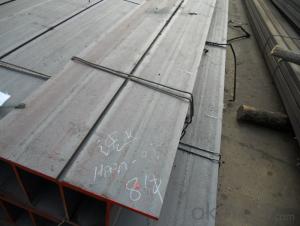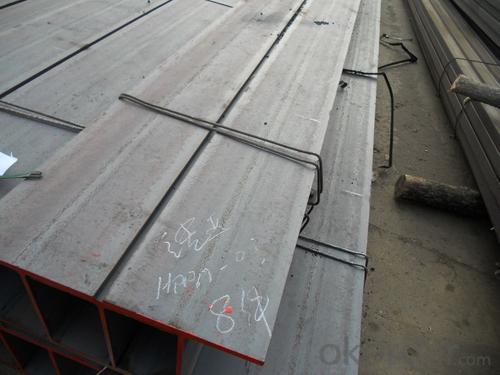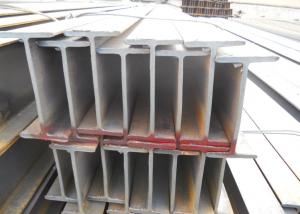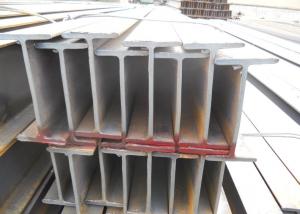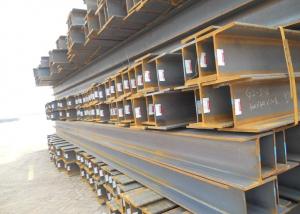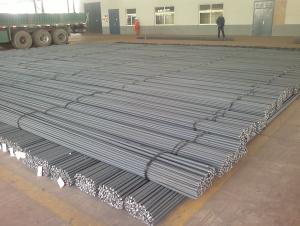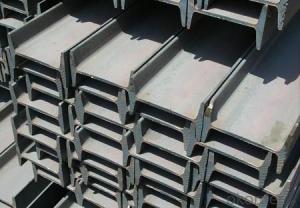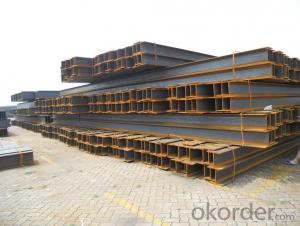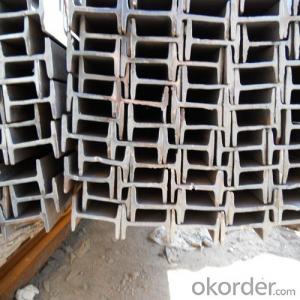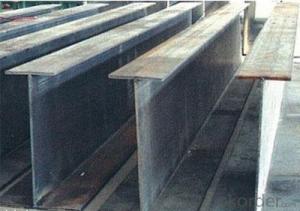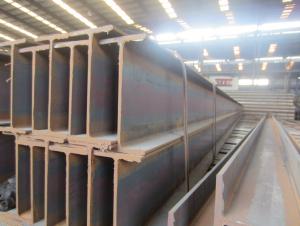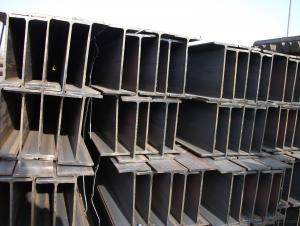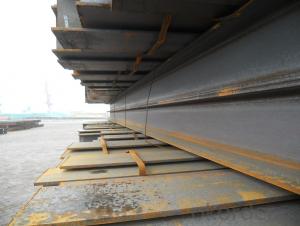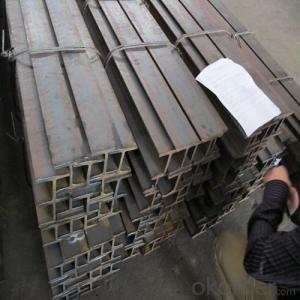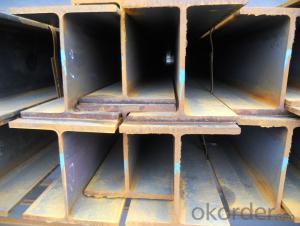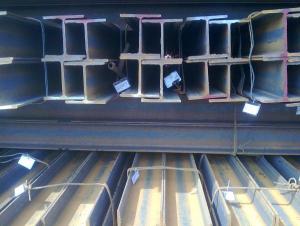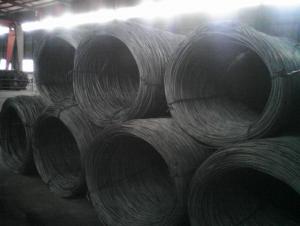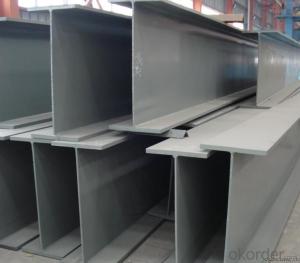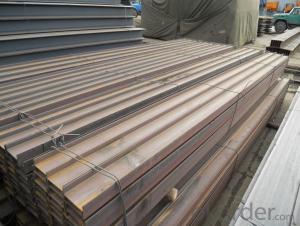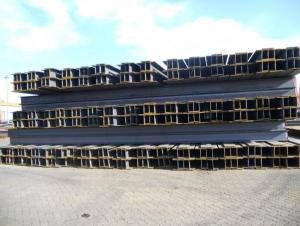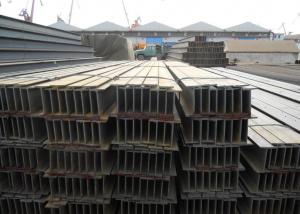Hot Rolled Steel H-Beam GB/JIS/ASTM/DIN High Qulity
- Loading Port:
- Tianjin
- Payment Terms:
- TT OR LC
- Min Order Qty:
- 500 m.t.
- Supply Capability:
- 50000 m.t./month
OKorder Service Pledge
OKorder Financial Service
You Might Also Like
Specification
Product Description:
OKorder is offering Hot Rolled Steel H-Beam GB/JIS/ASTM/DIN High Qulity at great prices with worldwide shipping. Our supplier is a world-class manufacturer of steel, with our products utilized the world over. OKorder annually supplies products to European, North American and Asian markets. We provide quotations within 24 hours of receiving an inquiry and guarantee competitive prices.
Product Applications:
Hot Rolled Steel H-Beam GB/JIS/ASTM/DIN High Qulity are ideal for structural applications and are widely used in the construction of buildings and bridges, and the manufacturing, petrochemical, and transportation industries.
Product Advantages:
OKorder's Hot Rolled Steel H-Beam GB/JIS/ASTM/DIN High Qulity are durable, strong, and resist corrosion.
Main Product Features:
· Premium quality
· Prompt delivery & seaworthy packing (30 days after receiving deposit)
· Corrosion resistance
· Can be recycled and reused
· Mill test certification
· Professional Service
· Competitive pricing
Product Specifications:
H x B
(mm)
| T1 | T2 | JIS Weight
(kg/m)
| GB Weight
(kg/m)
|
100*100 | 6 | 8 | 16.9 | 17.2 |
125*125 | 6.5 | 9 | 23.6 | 23.8 |
150*75 | 5 | 7 | 14 | 14.3 |
148*100 | 6 | 9 | 20.7 | 21.4 |
150*150 | 7 | 10 | 31.1 | 31.9 |
175*90 | 5 | 8 | 18 | 18.2 |
175*175 | 7.5 | 11 | 40.4 | 40.4 |
198*99 | 4.5 | 7 | 17.8 | 18.5 |
200*100 | 5.5 | 8 | 20.9 | 21.7 |
194*150 | 6 | 9 | 29.9 | 31.2 |
200*200 | 8 | 12 | 49.9 | 50.5 |
248*124 | 5 | 8 | 25.1 | 25.8 |
250*125 | 6 | 9 | 29 | 29.7 |
244*175 | 7 | 11 | 43.6 | 44.1 |
250*250 | 9 | 14 | 71.8 | 72.4 |
298*149 | 5.5 | 8 | 32 | 32.6 |
298*201 | 9 | 14 | 65.4 | |
300*150 | 6.5 | 9 | 36.7 | 37.3 |
294*200 | 8 | 12 | 55.8 | 57.3 |
300*300 | 10 | 15 | 93 | 94.5 |
346*174 | 6 | 9 | 41.2 | 41.8 |
350*175 | 7 | 11 | 49.4 | 50 |
340*250 | 9 | 14 | 78.1 | 79.7 |
350*350 | 12 | 19 | 135 | 137 |
400*200 | 8 | 13 | 65.4 | 66 |
390*300 | 10 | 16 | 105 | 107 |
400*400 | 13 | 21 | 172 | 172 |
446*199 | 8 | 12 | 65.1 | 66.7 |
450*200 | 9 | 14 | 77.9 | 79.5 |
440*300 | 11 | 18 | 121 | 124 |
496*199 | 9 | 14 | 77.9 | 79.5 |
500*200 | 10 | 16 | 88.2 | 89.6 |
488*300 | 11 | 18 | 125 | 129 |
596*199 | 10 | 15 | 92.5 | 95.1 |
600*200 | 11 | 17 | 103.4 | 106 |
588*300 | 12 | 20 | 147 | 151 |
700*300 | 13 | 24 | 182 | 185 |
800*300 | 14 | 26 | 207 | 210 |
900*300 | 16 | 28 | 240.1 | 243 |
Usage & Applications of Hot Rolled Steel H-beam For Sale
Commercial building structure ;Pre-engineered buildings; Machinery support structure; Prefabricated structure; Medium scale bridges; Ship-building structure.etc.
Production flow of Hot Rolled Steel H-beam For Sale
Material prepare (billet) —heat up—rough rolling—precision rolling—cooling—packing—storage and transportation
*If you would like to get our price, please inform us the size, standard/material and quantity. Thank you very much for your attention.
FAQ:
Q1: Why buy Materials & Equipment from OKorder.com?
A1: All products offered byOKorder.com are carefully selected from China's most reliable manufacturing enterprises. Through its ISO certifications, OKorder.com adheres to the highest standards and a commitment to supply chain safety and customer satisfaction.
Q2: How do we guarantee the quality of our products?
A2: We have established an advanced quality management system which conducts strict quality tests at every step, from raw materials to the final product. At the same time, we provide extensive follow-up service assurances as required.
Q3: How soon can we receive the product after purchase?
A3: Within three days of placing an order, we will begin production. The specific shipping date is dependent upon international and government factors, but is typically 7 to 10 workdays.
Q4: What makes stainless steel stainless?
A4: Stainless steel must contain at least 10.5 % chromium. It is this element that reacts with the oxygen in the air to form a complex chrome-oxide surface layer that is invisible but strong enough to prevent further oxygen from "staining" (rusting) the surface. Higher levels of chromium and the addition of other alloying elements such as nickel and molybdenum enhance this surface layer and improve the corrosion resistance of the stainless material.
Q5: Can stainless steel rust?
A5: Stainless does not "rust" as you think of regular steel rusting with a red oxide on the surface that flakes off. If you see red rust it is probably due to some iron particles that have contaminated the surface of the stainless steel and it is these iron particles that are rusting. Look at the source of the rusting and see if you can remove it from the surface.
Images:
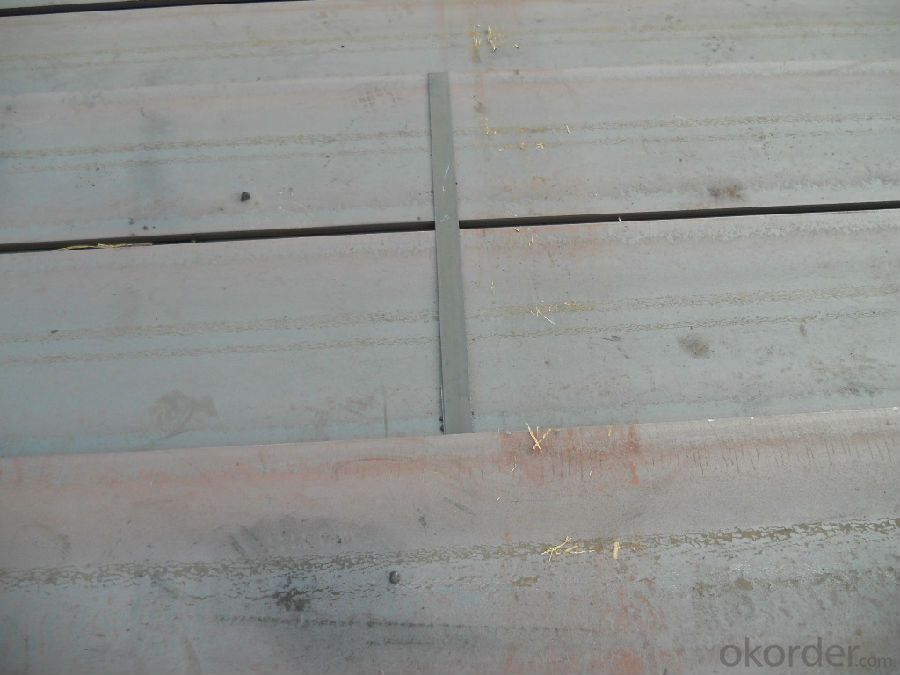
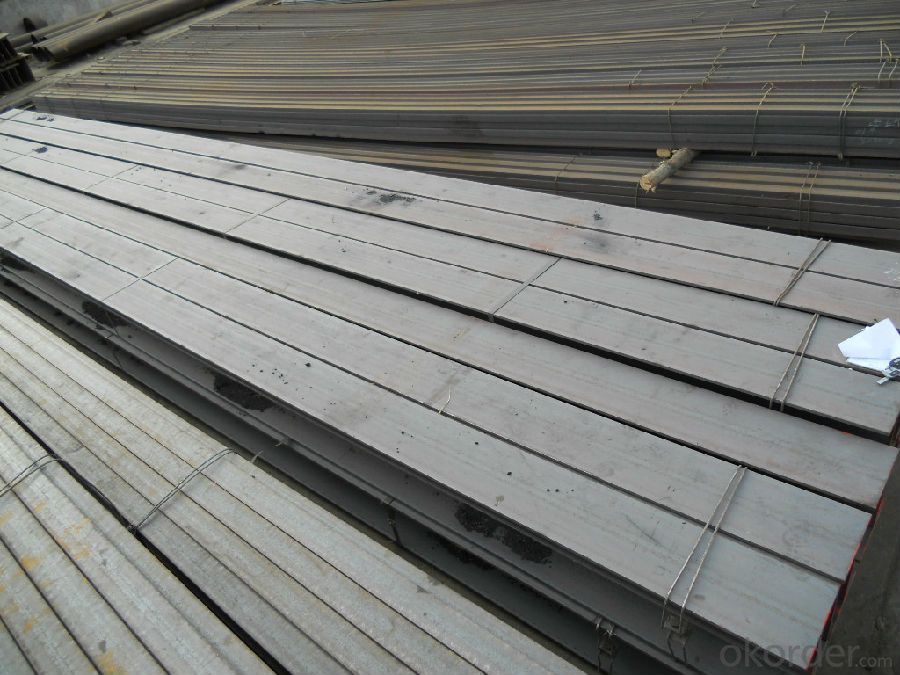
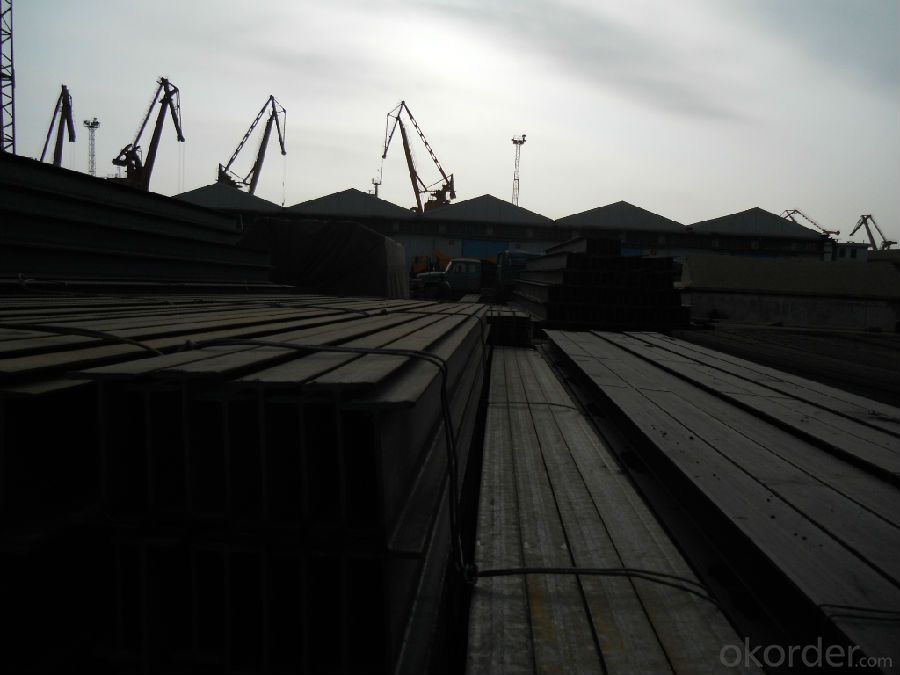
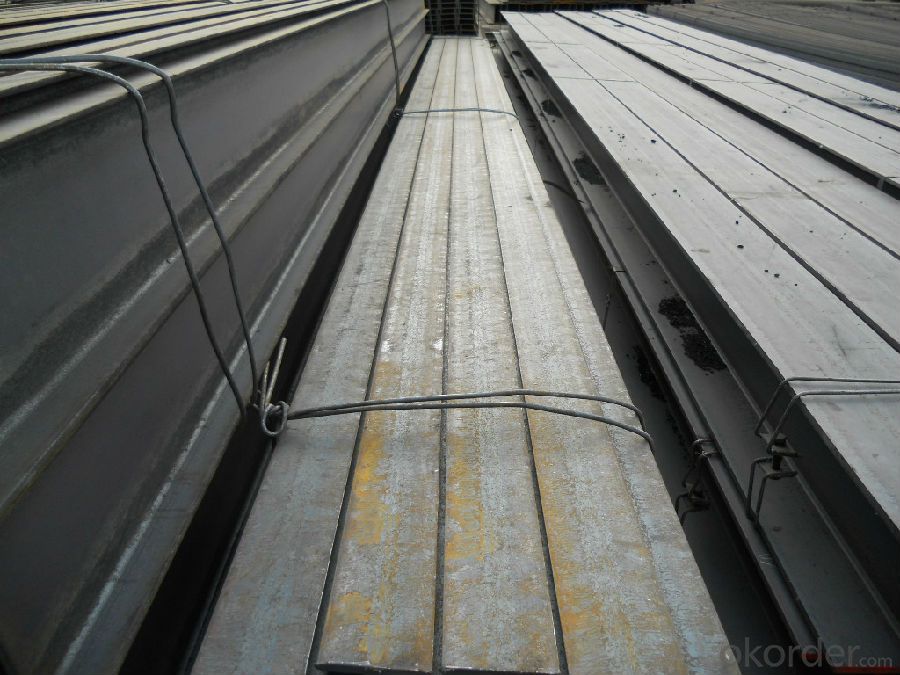
- Q: Can steel H-beams be used for bridges?
- Certainly! Bridges can indeed make use of steel H-beams. Due to their durability, versatility, and high strength-to-weight ratio, steel H-beams are frequently employed in the construction of bridges. These beams possess exceptional load-bearing capacity and can withstand heavy loads, making them suitable for a wide range of bridge designs and spans. Furthermore, steel H-beams exhibit resistance to corrosion, a vital characteristic for bridges that are exposed to environmental elements. The availability of these beams in various sizes and shapes enables engineers to design bridges that meet specific requirements. All in all, steel H-beams are a favored option when it comes to constructing bridges, thanks to their unwavering structural integrity and reliability.
- Q: Are steel H-beams resistant to termites or other pests?
- Steel H-beams possess a remarkable resistance against termites and other pests. Unlike wooden beams, steel does not serve as a food source for these pests, thus making it a superb selection for structural components in buildings. Steel beams lack any nutritional value or cellulose content that would attract pests, guaranteeing their immunity to termite infestations or other issues related to pests. Moreover, steel is also impervious to rotting, warping, and decay, ensuring the longevity and durability of the structure. Consequently, steel H-beams emerge as a dependable and pest-resistant alternative for construction ventures.
- Q: Are steel H-beams suitable for use in earthquake-prone areas?
- Yes, steel H-beams are suitable for use in earthquake-prone areas. Steel has excellent strength and ductility, making it highly resistant to seismic forces. H-beams, with their structural stability and ability to distribute loads, are commonly used in earthquake-resistant construction.
- Q: Can steel H-beams be used in exhibition halls or convention centers?
- Indeed, exhibition halls or convention centers can utilize steel H-beams. These beams are frequently employed in construction owing to their robustness and longevity. They furnish structural reinforcement and possess the capacity to endure substantial burdens, rendering them appropriate for capacious and unobstructed environments such as exhibition halls or convention centers. Moreover, steel H-beams can be readily manufactured and tailored to satisfy the precise design prerequisites of these establishments.
- Q: How do steel H-beams perform in structures with large spans and cantilevers?
- The excellent strength-to-weight ratio and structural stability of steel H-beams make them widely used in structures with large spans and cantilevers. These beams can withstand heavy loads and provide maximum support over extended distances. Applications such as bridges, stadiums, warehouses, and industrial buildings benefit from the superior load-bearing capacity of steel H-beams. They allow for longer distances between support points, thanks to their H-shape that provides increased strength and rigidity against bending and deflection under heavy loads. Steel H-beams are also beneficial for cantilevers, as their inherent strength allows for longer cantilever lengths without compromising structural integrity. This is particularly useful in architectural designs that require open spaces or unique configurations, like cantilevered balconies, overhangs, or roof extensions. Construction methods and connections are made easier with steel H-beams, as they can be easily welded or bolted together. Their wide flanges provide ample surface area for attaching other structural components, such as columns, girders, or floor systems. Furthermore, steel H-beams offer excellent resistance to fire, corrosion, and weathering, making them suitable for both indoor and outdoor applications. Their durability ensures long-term performance and minimal maintenance requirements. In conclusion, steel H-beams are an ideal choice for structures with large spans and cantilevers. Their strength, stability, and versatility make them highly effective in supporting heavy loads and achieving architectural designs that require extended distances or unique configurations.
- Q: Are steel H-beams resistant to earthquakes?
- Due to their strength and structural integrity, steel H-beams are commonly used in construction. They have been proven to be highly resistant to earthquakes. The H-beam's unique shape provides excellent load-bearing capacity and stability, making it a reliable choice for areas prone to earthquakes. One reason why steel H-beams resist earthquakes is their ability to flex without breaking. During an earthquake, the ground shakes and moves in different directions. The flexibility of steel H-beams allows them to absorb and distribute the seismic energy, enabling them to withstand the lateral forces produced by the earthquake. This flexibility prevents the beams from fracturing or collapsing under the intense stress. Furthermore, steel H-beams are renowned for their ductility, meaning they can deform without losing their strength. This quality is particularly important during seismic events. As the ground shakes, the H-beams can flex and bend, absorbing the energy and reducing the impact on the overall structure. This ductility ensures that the beams can withstand the dynamic forces of an earthquake while maintaining their structural integrity. Additionally, steel H-beams possess high tensile strength, allowing them to withstand significant tension. This is crucial during an earthquake when the ground movements can create tension forces within the building. The strong tensile strength of the H-beams enables them to resist these forces and prevent structural failure. In conclusion, steel H-beams are indeed resistant to earthquakes. Their flexibility, ductility, and high tensile strength enable them to withstand the lateral and dynamic forces generated by seismic events. By incorporating steel H-beams into construction designs, engineers can enhance the seismic resistance of buildings and ensure the safety of occupants during earthquakes.
- Q: Can steel H-beams be used for parking structures?
- Parking structures can indeed utilize steel H-beams. Commonly referred to as I-beams, steel H-beams are widely used in construction due to their structural strength and load-bearing capabilities. Their design enables them to endure heavy loads and provide exceptional support, qualifying them for various applications, including parking structures. Steel H-beams offer multiple advantages for parking structures. For instance, they have the ability to span long distances without the need for intermediate support columns, thereby maximizing space utilization. Moreover, steel is a resilient and long-lasting material that can withstand harsh weather conditions and resist fire, corrosion, and pests. Hence, steel H-beams are an excellent choice for constructing parking structures that necessitate strength, stability, and durability.
- Q: How do steel H-beams contribute to energy efficiency in buildings?
- Energy efficiency in buildings can be enhanced in various ways through the use of steel H-beams. Firstly, these beams are renowned for their strength and durability, enabling the construction of larger open spaces and window openings. This facilitates the entry of natural light into the building, reducing the reliance on artificial lighting during daylight hours. Not only does natural light reduce energy consumption, but it also positively impacts the well-being and productivity of occupants. Secondly, steel H-beams possess excellent thermal properties, including a high thermal mass that efficiently absorbs and stores heat energy. This characteristic regulates indoor temperature by slowing down the transfer of heat through the building envelope. Consequently, less energy is required for heating and cooling, resulting in decreased energy consumption and lower utility bills. Furthermore, steel H-beams play a crucial role in the insulation of buildings. They provide a stable framework for the installation of insulation materials such as mineral wool or foam. Proper insulation prevents thermal bridging, which involves the transfer of heat between the interior and exterior of a building through solid materials. By minimizing thermal bridging, steel H-beams significantly enhance the building's overall thermal performance, reducing the need for excessive heating or cooling. Additionally, steel H-beams are frequently utilized in the construction of green roofs and solar panel systems. Green roofs offer insulation, reduce stormwater runoff, and improve air quality. Solar panels harness renewable energy from the sun and convert it into electricity. Steel H-beams provide the necessary support and structural integrity for these sustainable features, further contributing to the building's energy efficiency. In conclusion, steel H-beams are essential components in the construction of energy-efficient buildings. Their ability to allow more natural light, provide excellent thermal properties, enable proper insulation, and support sustainable features makes them indispensable in enhancing energy efficiency. With their strength, durability, and versatility, steel H-beams play a vital role in constructing energy-efficient buildings.
- Q: How to process arc H steel?
- Small curvature component, is not the case, with the bending machine, about 600~800 yuan / ton, if the components or large curvature, according to the KONGGUOQING1, when considering the material, principle, or the use of thermal effect of heat bending, and bending frequency
- Q: Can steel H-beams be used in the construction of transportation hubs or terminals?
- Yes, steel H-beams can be used in the construction of transportation hubs or terminals. Steel H-beams are commonly used in structural applications due to their strength, durability, and ability to support heavy loads. In transportation hubs or terminals, where large open spaces and long spans are often required, steel H-beams provide a reliable and cost-effective solution for creating strong and stable structures.
Send your message to us
Hot Rolled Steel H-Beam GB/JIS/ASTM/DIN High Qulity
- Loading Port:
- Tianjin
- Payment Terms:
- TT OR LC
- Min Order Qty:
- 500 m.t.
- Supply Capability:
- 50000 m.t./month
OKorder Service Pledge
OKorder Financial Service
Similar products
Hot products
Hot Searches
Related keywords
